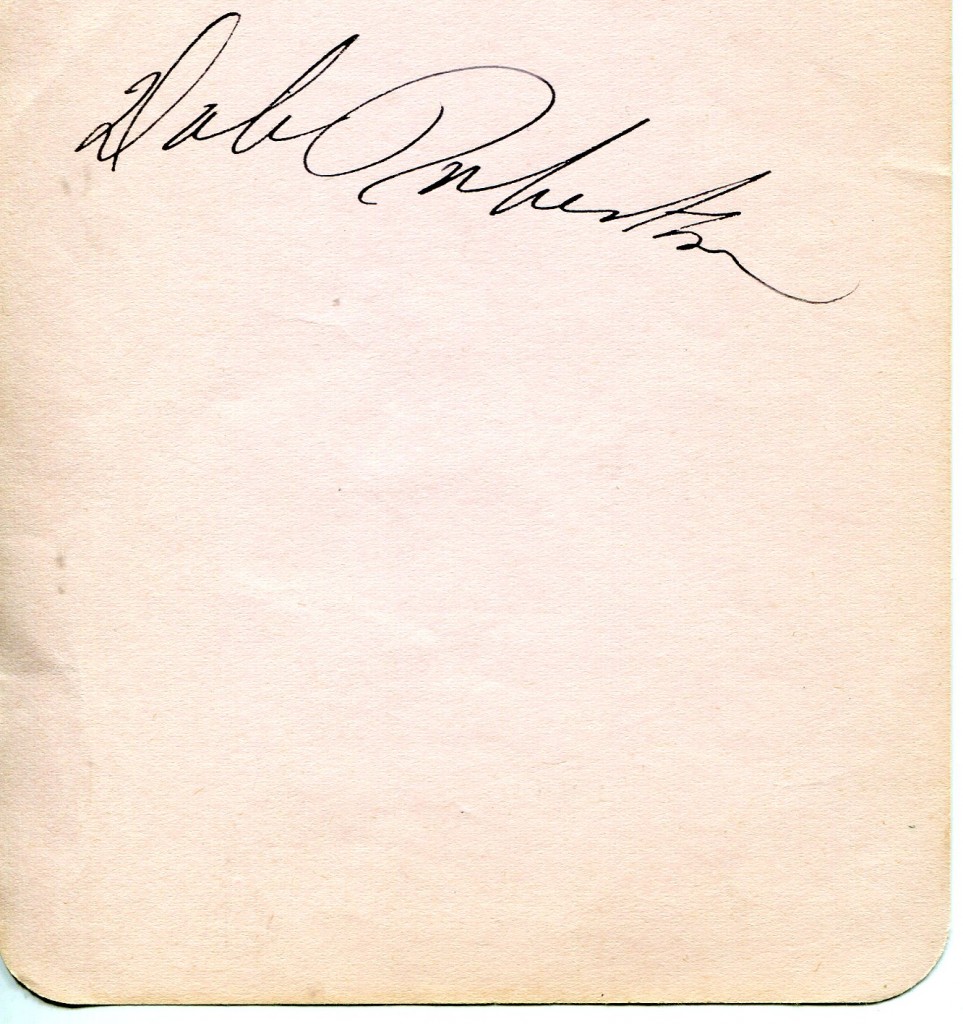
Ronald Bergan’s “Guardian” obituary:
In Hollywood, in the days when men were men, Dale Robertson, who has died aged 89, was considered the epitome of masculinity. In the Clarion Call episode from O Henry’s Full House (1952), a giggling, snivelling crook, played by Richard Widmark, whom Robertson, a cop, has come to arrest, keeps calling him “the beeg man”. Robertson, an ex-prize fighter, was indeed “beeg” – tall, well-built and ruggedly handsome, with a gravelly voice. He was tough but fair to men, and courteous to ladies, particularly in the many westerns in which he starred in the 1950s, and in his most famous role, that of special investigator Jim Hardie in the TV series Tales of Wells Fargo.
He was born Dayle Lymoine Robertson, in Harrah, Oklahoma, and attended Oklahoma Military Academy, Claremore, where he was named “all around outstanding athlete”. During the second world war, he served with Patton’s Third Army, winning bronze and silver stars, before having his knee shattered by German mortar fire. He claimed that, had it not been for this injury, he would have pursued a professional boxing career.
When Robertson was stationed in California, he had his photograph taken to send to his mother. The photographer liked the picture so much that he enlarged it and put in his window. It was seen by talent agents, who contacted Robertson.
Without ever having acted, or taken a lesson, Robertson made for Hollywood in 1946, but it took two years before he was given a few small roles at various studios, one as a lifeguard in The Girl from Jones Beach (1949). Then Nat Holt, producer of westerns, cast him as Jesse James in Fighting Man of the Plains (1949). It was a small role, but Robertson got to rescue Randolph Scott from the gallows at the last minute, and was offered a long-term contract with 20th Century Fox.
He was given a supporting role as a hardened soldier in Robert Wise’s civil-war western Two Flags West (1950), and Fox decided to try him in a couple of musicals in 1951: Call Me Mister, starring Betty Grable, in which he played a doting soldier; and Golden Girl, in which he co-starred with Mitzi Gaynor, he as a Confederate spy, she a Yankee showgirl.
He got his first top billing in Return of the Texan (1952), and subsequently settled down to being a cowboy hero in a number of competently made westerns at Fox, often co-starring with the studio’s young contract players, as in The Silver Whip (1953) with Rory Calhoun and Robert Wagner. Occasionally, Robertson had a change of pace, as in the period musical The Farmer Takes a Wife (1953) in which he sang (not badly) We’re in Business, with Grable.
Robertson’s favourite among his own movies was The Gambler from Natchez (1954), in which he played the title role of a man on the track of three men who had killed his father. In Sitting Bull, the same year, he played an army major who brings about peace between the Sioux tribe and the American forces. The romance on and off screen was provided by Mary Murphy, who had just played Marlon Brando’s girlfriend in The Wild One. She and Robertson were married the same year; however, the marriage was annulled six months later because Murphy claimed her husband did not want children. (Actually, Robertson already had a daughter by his first wife.)
Robertson, who always professed his love of God and country, was never very co-operative with the press, even once shunning the powerful columnist Louella Parsons. As a result, he won the press Sour Apple Celebrity award for three years running. But then, commented Robertson, “that dang Sinatra had to hit some photographer in the nose and stop me from getting my fourth”.
One of his rare appearances in contemporary clothes was in Top of the World (1955), as a senior jet pilot naturally piqued when transferred from Honolulu to the frozen Arctic.
As the movie western declined in the late 1950s, Robertson found his niche in westerns for TV, such as Tales of Wells Fargo, which ran for four years from 1957. The stories revolved around Robertson as troubleshooter for the pioneering transport company. Not always the most animated of actors, Robertson was effective as a stolid, taciturn type, often letting his left-handed gun speak for him. His other long-running series was Iron Horse (1966-68), in which he was a gambler turned railway baron.
In the 60s, Robertson returned to the big screen in a few B westerns, and starred in the British-made Coast of Skeletons (1964) as a US tycoon whose African diamond operation is being investigated by Richard Todd. However, most of his later appearances were on TV, in series such as Death Valley Days, and as a guest on Love Boat, Murder She Wrote, Dallas and Dynasty, while he lived in semi-retirement at his ranch in Oklahoma.
There, he and his fourth wife, Susan, and his two daughters, Rochelle and Rebel, who survive him, bred polo ponies and racehorses.
• Dale Robertson (Dayle Lymoine Robertson), actor, born 14 July 1923; died 27 February 2013.
The above “Guardian” obituary can also be accessed online here.


